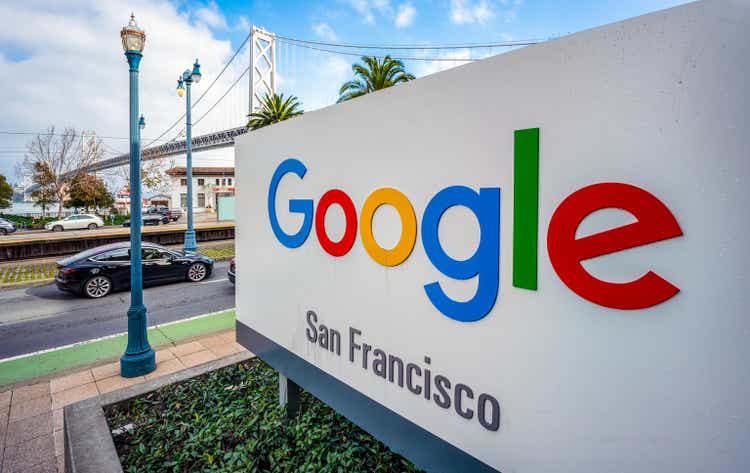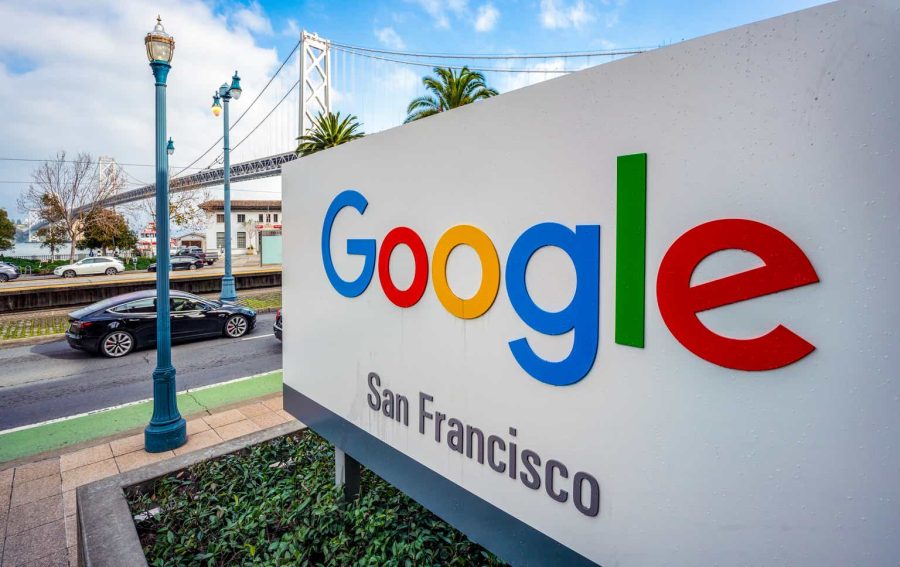Summary:
- We initiated a new position in Alphabet (the parent company of Google) as we believe the risk-reward equation has become increasingly attractive.
- We believe the stock is put, unfairly in our view, in the GenAI loser bucket.
- While the advancements of GenAI represent a risk to Google, we believe investors underappreciate the company’s positioning in AI and have assigned too high of a probability that the risk materializes.
- We continue to monitor the risk from GenAI disrupting search, particularly given Google’s large market share today but believe the valuation is attractive and reflects too high of a probability for a bad outcome.
georgeclerk
The following segment was excerpted from this fund letter.
Alphabet / Google (NASDAQ:GOOG,NASDAQ:GOOGL)
During the first quarter, we initiated a new position in Alphabet ( the parent company of Google, the world’s largest search and online advertising company) as we believe the risk-reward equation has become increasingly attractive for long-term investors with the stock put, unfairly in our view, in the GenAI loser bucket.
Alphabet has over 90% market share in its core Google search business, it owns the world’s leading video platform, YouTube (which has over 2 billion users), a competitive cloud service provider, Google Cloud, a leading ad network, and optionality in a number of smaller subsidiaries like the autonomous vehicle company, Waymo.
Google’s core search business continues to grow at a solid clip, and we believe it could structurally earn much higher margins than it does today as the company increases operating efficiency. Google Cloud should also continue growing in the healthy double digits for years to come given the relatively early stage of cloud adoption with $597 billion total cloud spending1 in 2023 out of worldwide IT spending of $4.7 trillion2, or around 13%. Additionally, YouTube has a long runway for growth, driven by the growing adoption of connected TV and the shift of advertising dollars from linear TV.
When ChatGPT originally came out in November 2022, it appeared that Google was caught a bit unprepared for a potential change in the way people search. While the advancements of GenAI represent a risk to Google, we believe investors underappreciate the company’s positioning in AI and have assigned too high of a probability that the risk materializes.
Alphabet owns the largest consumer training datasets (particularly across Search and YouTube), which in our view are important ingredients for competitive advantages in AI, it has massive user distribution (nine products with over 1 billion users each), long-standing AI research labs (DeepMind and Google Brain), top AI/ML engineering talent (Google invented the transformer AI architecture3, which is the basis for the modern LLMs including ChatGPT), a solid cloud computing division in Google Cloud, and deep pockets for investing in AI.
In the past 18 months since ChatGPT was introduced, Google has substantially ramped up the speed of its AI product release, including the public previews of Search Generative Experience (GenAI enhanced Google search) and its Gemini large language models. Importantly, over this time period, Google has maintained its roughly 90% share in search (Bing and startups have not taken meaningful share to date). Google also shared at a recent conference4 that despite the growth of ChatGPT, it has seen “positive search query growth in all of our major markets, and this has been consistent over the last 12 months.”
Google has also taken advantage of its distribution to unlock various benefits of GenAI, such as helping advertisers generate creative content in different formats or helping them optimize their budgets across Google’s various platforms. Additional opportunities that GenAI creates for Google include improving its existing offerings (e.g., GenAI offerings for YouTube creators) and helping drive demand for Google Cloud, which now offers a managed AI service called Vertex AI.
We continue to monitor the risk from GenAI disrupting search, particularly given Google’s large market share today but believe the valuation is attractive and reflects too high of a probability for a bad outcome. Alphabet also has real value in assets such as Waymo, which are not factored into valuation today (and are potentially included at a negative valuation as they currently generate losses, hurting EPS). We also believe Alphabet has further room to improve its cost discipline, given its high margin core Search business and similar efficiency measures taken at other large technology companies.
Altogether, we believe Alphabet has a reasonable path to growing EPS at a mid-teens rate for years to come. On the back of Alphabet’s strong fundamentals and a reasonable valuation (approximately 20 times P/E5 for a business of this dominance and quality), we decided to add Alphabet to the portfolio.
|
Footnotes 1https://www.gartner.com/en/newsroom/press-releases/2023-04-19-gartner-forecasts-worldwide-public-cloud-end-user-spending-to-reach nearly-600-billion-in-2023#:~:text=Gartner%20Forecasts%20Worldwide%20Public%20Cloud,Nearly%20%24600%20Billion%20in%202023 2https://www.gartner.com/en/newsroom/press-releases/01-17-2024-gartner-forecasts-worldwide-it-spending-to-grow-six-point-eight-percent-in-2024 4Alphabet’s presentation at the Morgan Stanley TMT conference, March 2024. 5On 2025 expected EPS consensus as collected by FactSet. Investors should consider the investment objectives, risks, and charges and expenses of the investment carefully before investing. The prospectus and summary prospectus contain this and other information about the Funds. You may obtain them from the Funds’ distributor, Baron Capital, Inc., by calling 1-800-99-BARON or visiting Baron Funds – Asset Management for Growth Equity Investments. Please read them carefully before investing. Risks: The Fund invests primarily in large cap equity securities which are subject to price fluctuations in the stock market. Even though the Fund is diversified, it may establish significant positions where the Adviser has the greatest conviction. This could increase volatility of the Fund’s returns. The Fund may not achieve its objectives. Portfolio holdings are subject to change. Current and future portfolio holdings are subject to risk. There is no guarantee that these objectives will be met. The discussions of the companies herein are not intended as advice to any person regarding the advisability of investing in any particular security. The views expressed in this report reflect those of the respective portfolio managers only through the end of the period stated in this report. The portfolio manager’s views are not intended as recommendations or investment advice to any person reading this report and are subject to change at any time based on market and other conditions and Baron has no obligation to update them. This report does not constitute an offer to sell or a solicitation of any offer to buy securities of Baron Fifth Avenue Growth Fund by anyone in any jurisdiction where it would be unlawful under the laws of that jurisdiction to make such offer or solicitation. Price/Earnings Ratio or P/E (next 12-months): is a valuation ratio of a company’s current share price compared to its mean forecasted 4 quarter sum earnings per share over the next twelve months. If a company’s EPS estimate is negative, it is excluded from the portfolio-level calculation. BAMCO, Inc. is an investment adviser registered with the U.S. Securities and Exchange Commission (SEC). Baron Capital, Inc. is a broker-dealer registered with the SEC and member of the Financial Industry Regulatory Authority, Inc. (FINRA). |
Editor’s Note: The summary bullets for this article were chosen by Seeking Alpha editors.
